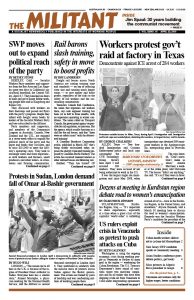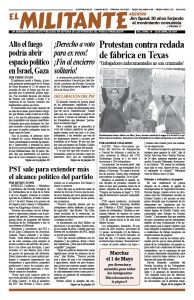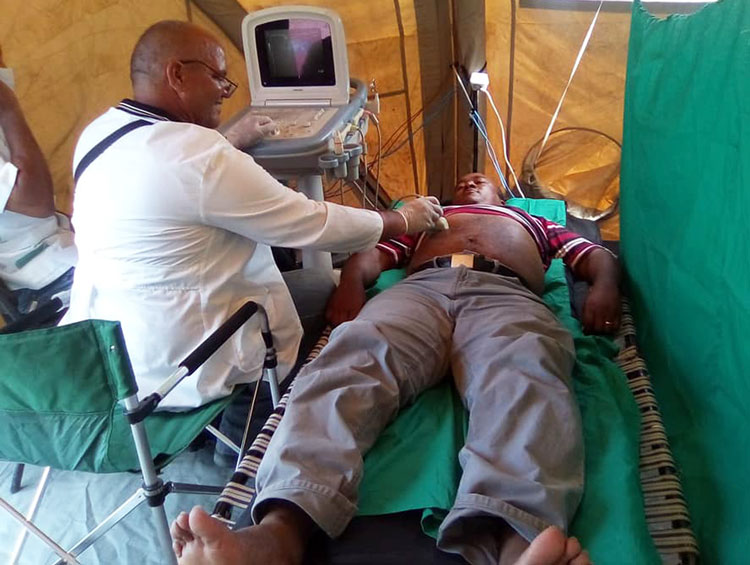A brigade of 40 Cuban health workers have been in the coastal city of Beira, Mozambique, providing aid to those injured and ill in the wake of a devastating hit there by Cyclone Idai March 14. The storm wreaked havoc across Mozambique, Zimbabwe and Malawi. The Cuban government sent members of the Henry Reeve International Contingent of Physicians Specialized in Disaster Situations and Serious Epidemics.
“More than 400 patients a day seen in a Cuban hospital in Sofala,” the Cuban medical brigade said April 1 in a post on its Facebook page. The members of the specialized contingent joined over 270 Cuban doctors and nurses already in Mozambique as part of a longer-term program to provide medical services to workers and peasants there. They were among the first to join the recovery efforts providing care and clearing debris from damaged medical facilities.
Nearly 900 people died in the three countries from rain and flooding. The storm surge left an area nearly 80 miles long by 15 miles wide under water around Mozambique’s coastal cities. Hundreds of thousands lost their homes and crops — nearly 90 percent of Beira, home to 500,000 people, was damaged or destroyed — and people are facing the looming threat of a cholera outbreak and other diseases.
The ensuing social disaster was magnified by a legacy of imperialist underdevelopment and exploitation in what is one of the poorest countries in the world — even though it has rich farmland and vast resources of coal and natural gas.
After winning its independence from Portugal in 1975, Mozambique was devastated by a civil war that lasted over 15 years. The post-independence FRELIMO-led governments (Mozambique Liberation Front) did not undertake a course to organize the country’s exploited producers to fight in their own class interests and take power.
Instead, imperialism’s plunder and capitalist exploitation has continued, coupled with official corruption, with devastating consequences for working people.
Following the discovery in 2011 of huge natural gas reserves, the country’s rulers were beset by predatory imperialist investors. Up until 2018, Mozambique became one of the world’s fastest growing economies, producing billions in profits for the investors, and leaving the social and economic burden to Mozambican toilers to carry.
Cuba’s internationalism
The brigade volunteers are “going with the best disposition to fulfill the internationalist commitment of Cuban health professionals,” Cuban Health Minister José Ángel Portal Miranda said to members of the Henry Reeve contingent on their way to Mozambique.
More than half of the brigade’s members have served in medical missions — some more than once — in other countries. Cuba’s revolutionary government has made missions to provide medical care a hallmark of its international solidarity, including helping to lead the fight against the 2014-15 Ebola epidemic in Africa. The brigade — named after a young fighter from the U.S. who joined and died in the Cuban peoples’ struggle against Spanish colonialism in the 1870s — was formed in 2005.
“The richest, most developed societies, ruled by consumerism and a thirst for profit, have made the health service into a common business, inaccessible to the poorest sectors of the population,” Fidel Castro explained to the founding members of the brigade. From the beginning of the Cuban Revolution, he said, workers and farmers there have viewed it as a duty to provide this kind of solidarity “since Cuba sent its first brigade [in 1963] to Algeria, a country that had just freed itself from colonialism following an heroic struggle for independence.”
“It’s my first [medical] mission abroad and I am very proud it is with the Henry Reeve contingent,” said nurse José Luis Díaz. “To provide aid in a disaster zone means a lot to me.”
There are currently more than 50,000 Cuban doctors, nurses and medical technicians in over 65 countries around the world.
The U.S. capitalist rulers and media, fearful of that example, wage a constant smear campaign against the contributions of Cuban medical volunteers. On March 17 the New York Times published an article accusing Venezuela President Nicolás Maduro of using Cuban medical personnel in that country as a tool to “coerce Venezuela voters.”
“Over the years we have earned international prestige because of our selfless solidarity and willingness to give our lives in order to save others,” Cuban medical volunteers in Gambia wrote in response.
“Señores imperialistas, you have no clue what it is to be an internationalist,” said the statement. “As Fidel Castro taught us, ‘being an internationalist is paying our debt to humanity. Whoever is incapable of fighting for others will never be capable of fighting for himself.’”


